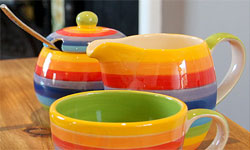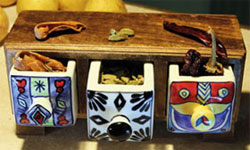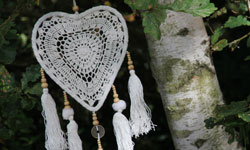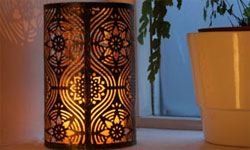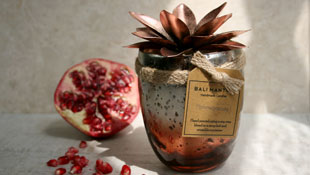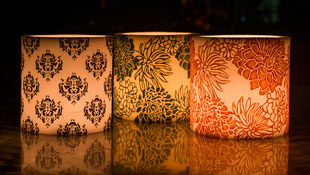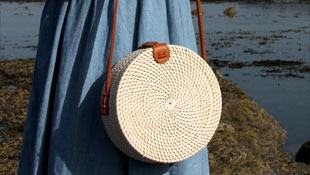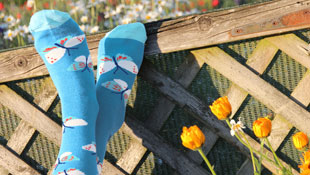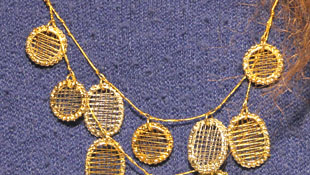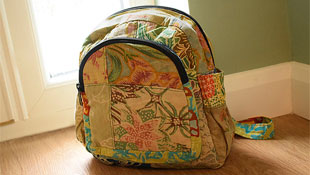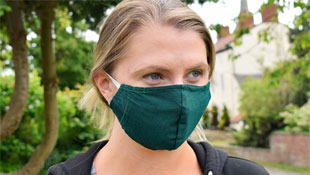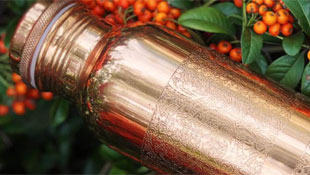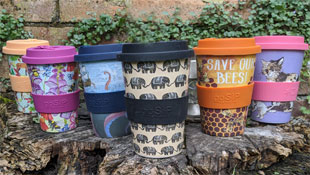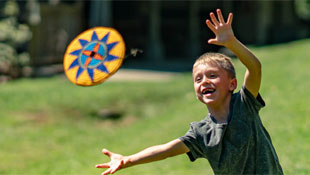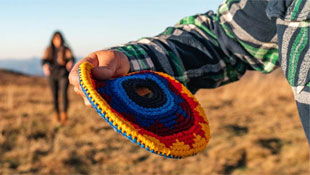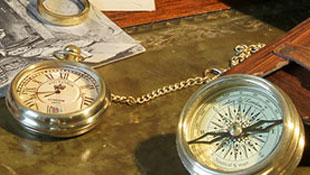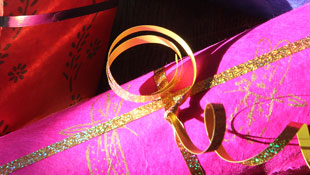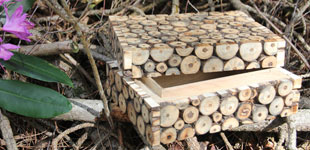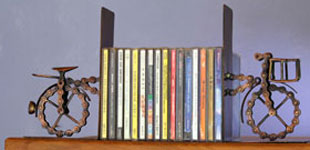Bali visit March 2023 - report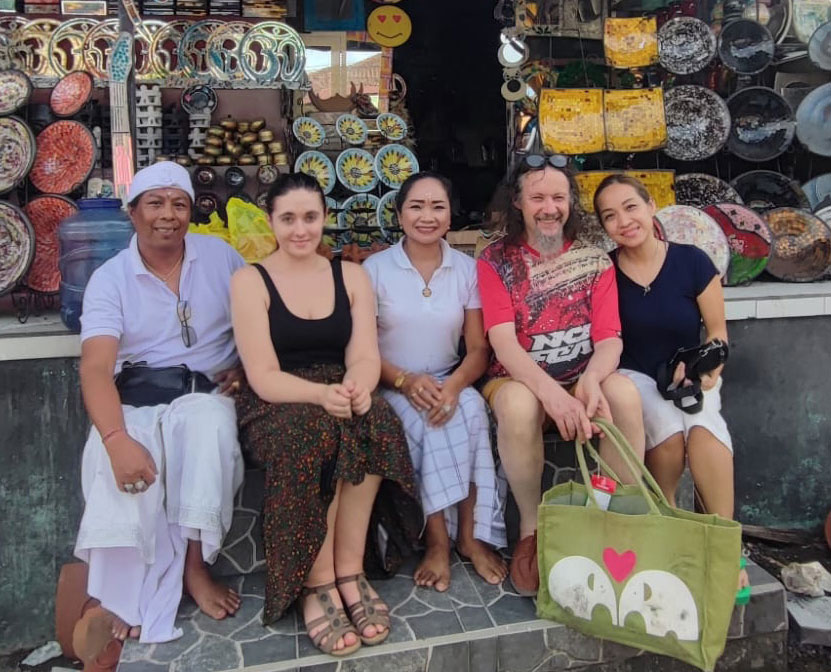 In March 2023 Shared Earth’s designer Lucie and MD Jeremy spent 10 days in Bali with Yuli (our Supplier Director). This was our first trip since 2019, before Covid.
We visited 21 producer groups: Ida (coconut bowls); Mama (suncatchers); Wayan Durga (wooden birds); Puja (woodcarving); Sanger (green men); Warta (glass on root wood); Suarsih (coloured recy glass chimes and bowls); Sukma Dewata (mosaics); Floria (patchwork bags/clothing); Ahmad Collection (patchwork clothing); Titi Martha (bamboo chimes); Mawar Sari (wood); Nugraha (stone); Ari (jewellery stands); Dedi Macrame (dreamcatchers); Wayan Sunarsa (bee/butterfly houses); Rizki (musical instruments); Ananta (metal chimes); Amerta Guna (aluminium boxes); Perdana (leaf notebooks); Trisurya (ceramics)
We also visited potential new suppliers making jewellery, recycled metal sculptures, recycled paint tin stools, and hammocks.
Almost every supplier had exciting new products since our 2019 visit – eg mosaics, gold coconut bowls, suncatchers, dreamcatchers, bamboo chimes, green men, and patchwork clothing. Mama had some great butterfly/dragonfly window suckers, to replace our discontinued BUGZ supplier. We also visited Yuli's small warehouse and met one of her two f/t assistants, Ami.
We visited the Sungai Watch river barrier we sponsor, met one of their founders Kelly at their HQ (being renovated to research usages for recycled plastic eg furniture), and visited one of their waste collection sorting points. They are growing fast with 180 barriers now in place, and regular beach and river clean-ups every Friday, sometimes with large teams of volunteers.
- We monitored the groups we visited against Fair Trade standards and these were our key findings:
There was substantial evidence that our orders are changing people's lives. One supplier (Suarsi) had been able to build a new workshop. Three artisans (employed by Floria, Ahmad Collection and Mama) had been able to build new homes. Dedi (macrame) had built a larger house, providing space for his mother's catering business. Titi Mertha said she had been able to clear her husband's debt as a result of our orders, as well as paying for his healthcare. Wayan Sunarsa had bought a new washing machine enabling his wife to expand her laundry business. Several suppliers said they had been able to afford school books and clothing which would not have possible otherwise.
- Our orders were a lifeline to many suppliers during Covid, often just providing enough for daily needs; some indicated that without them, they would have struggled to feed their families. Many skilled artisans had to go back to their villages and try to find work in the rice fields or growing food simply to subsist. Several said that orders had been cancelled by other customers.
- It became clear that many suppliers are in a much more precarious financial position than we thought. Often we are their only export customer, or one of 2 or 3, and even if our orders are small, sometimes they are a large percentage of their sales. The key priority for almost all our suppliers in Bali is market access, to obtain more customers and thereby greater financial security.
- Some suppliers are receiving orders from us almost every month and feel much more secure.
- Many suppliers expressed gratitude for the tools/machinery we recently bought them.
- Wages: almost all our suppliers are small family businesses, average workforce about 5-7, often family members. They appear be paying market rates, and although the artisans appear happy with them (security of work seems a more important consideration than the wage itself), they are often below the local Minimum Wage. In Ubud/Gianyar this is R2.6m/month, or R100,000/day, about £150/month or £5.60-£5.80/day. Some suppliers pay R80,000/day. The MW seems high compared to wages in eg India and we wonder, having seen the prices of some basic foodstuffs, whether the MW is actually higher than the Living Wage would be? Or should we increase the price we pay these suppliers, to enable them to pay higher wages??
- A number of suppliers have never kept accounts, other than keeping and issuing invoices. It’s the traditional way of doing business for artisans who are pretty much illiterate in business accounting of any kind.
- As small family businesses, many FT standards are hard to comprehend, for instance having an Equal Opportunities or a Maternity Policy, when a business consists of mother, son and niece - or any written policies for that matter.
- To balance this, with regard to Principle 6 (Equal Opportunities), out of 20 businesses, 3 were owned and run by husband/wife teams, 4 by men, and 13 by women.
- Asking suppliers what they are doing to tackle climate change or other environmental issues was almost insulting. All but one use recycled or sustainable local raw materials. Often, production takes place on verandas or in the open air, with no lighting required (and of course no heating because of the local climate). All production is by hand and machinery is minimal, as are any CO2 emissions which result from production. The producers’ lifestyles and production methods emphasised strongly that the climate crisis is caused by our consumerist lifestyles in the North, not by producers. It's we in the North who need to act, notably to address the CO2 emissions caused by us shipping these products around the world.
- Our suppliers’ knowledge of what Fair Trade means is minimal. Yuli will re-translate the 10 Principles into Indonesian, and potentially organise another workshop on FT.
Market access – an exciting new project!Almost all the meetings we had with producers emphasised one thing: that their key need is market access. So, we decided, with Yuli, and with producers’ help, to open a large new shop/showroom in Ubud, Bali’s craft centre, to attract other buyers globally, to expand the producers’ customer base so they don’t have to rely on us so much and have greater financial security. Preferably the land will be bought freehold and a new showroom built from scratch, including a small cafe, and accommodation for visitors to stay. A new business or membership organisation will be formed, named Sjahlendra Handicrafts, with active participation and part ownership of producers. Its aim would be to benefit the producers, not Shared Earth, which would not take profits from it. Yuli has already started looking into potential locations, will get advice on Indonesian law, and contact local FT umbrella organisations in Asia for advice.
This is a thrilling new project which could make a huge difference to the lives of hundreds of producers and their families. We estimate that we will need to raise about £40,000 to get the project off the ground. |


